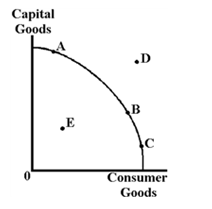Exam 3: The Fundamental Economic Problem: Scarcity and Choice
Exam 1: What Is Economics261 Questions
Exam 2: The Economy: Myth and Reality185 Questions
Exam 3: The Fundamental Economic Problem: Scarcity and Choice290 Questions
Exam 4: Supply and Demand: an Initial Look337 Questions
Exam 21: An Introduction to Macroeconomics216 Questions
Exam 22: The Goals of Macroeconomic Policy212 Questions
Exam 23: Economic Growth: Theory and Policy228 Questions
Exam 24: Aggregate Demand and the Powerful Consumer219 Questions
Exam 25: Demand-Side Equilibrium: Unemployment or Inflation216 Questions
Exam 26: Bringing in the Supply Side: Unemployment and Inflation228 Questions
Exam 27: Managing Aggregate Demand: Fiscal Policy210 Questions
Exam 28: Money and the Banking System224 Questions
Exam 29: Monetary Policy: Conventional and Unconventional210 Questions
Exam 30: The Financial Crisis and the Great Recession66 Questions
Exam 31: The Debate Over Monetary and Fiscal Policy219 Questions
Exam 32: Budget Deficits in the Short and Long Run215 Questions
Exam 33: The Trade-Off Between Inflation and Unemployment219 Questions
Exam 34: International Trade and Comparative Advantage226 Questions
Exam 35: The International Monetary System: Order or Disorder218 Questions
Exam 36: Exchange Rates and the Macroeconomy219 Questions
Exam 37: Contemporary Issues in the Us Economy23 Questions
Select questions type
President Barack Obama pushed forward a national health care plan to increase the availability of medical care for all Americans. How would one determine the opportunity cost of the proposal?
(Essay)
4.8/5  (31)
(31)
Scarcity of resources implies that people must make decisions consistent with the means they have available to them.
(True/False)
4.9/5  (39)
(39)
A ticket to an Eric Clapton concert costs $45. If you have a ticket, you can "scalp" it (sell it illegally) for $75. To a ticket holder, the opportunity cost of actually attending the concert is
(Multiple Choice)
4.8/5  (34)
(34)
An optimal decision is one that is selected based on an analysis of
(Multiple Choice)
4.8/5  (41)
(41)
In a well-functioning market, high opportunity costs will be reflected in high monetary costs.
(True/False)
4.9/5  (39)
(39)
A typical economy produces thousands of different goods. Is it accurate to say that society faces a production possibilities frontier?
(Multiple Choice)
4.8/5  (30)
(30)
Some environmentalists argue that the scarcity of physical resources such as fuel means that
(Multiple Choice)
4.9/5  (46)
(46)
As the term "opportunity cost" is defined in the text, the opportunity cost of going to college includes
(Multiple Choice)
4.8/5  (26)
(26)
Mick Jagger, a former student at the London School of Economics, once sang, "You can't always get what you want, but if you try sometime, you just might find you can get what you need." Another statement of the basic economic principle expressed in this lyric is that
(Multiple Choice)
4.9/5  (38)
(38)
The principle of comparative advantage helps explain trade between nations.
(True/False)
4.9/5  (40)
(40)
The tendency of opportunity cost to increase as production increases
(Multiple Choice)
4.7/5  (35)
(35)
Figure 3-2
 In Figure 3-2, the production possibilities frontier has a bowed-out shape because of the law of
In Figure 3-2, the production possibilities frontier has a bowed-out shape because of the law of
(Multiple Choice)
4.9/5  (44)
(44)
What is the basic task that economists expect the market to carry out?
(Multiple Choice)
4.8/5  (31)
(31)
Showing 41 - 60 of 290
Filters
- Essay(0)
- Multiple Choice(0)
- Short Answer(0)
- True False(0)
- Matching(0)